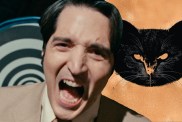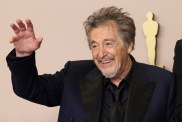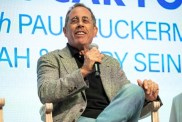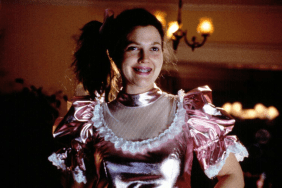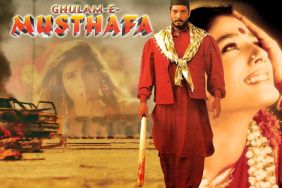Last year, ComingSoon.net spoke with filmmaker John Crowley about his acclaimed drama Boy A–that interview is here–and he told us about his next project Is Anybody There?, which had originally been intended as his follow-up to his award-winning 2003 film Intermission.
Is Anybody There? is a very different movie tonally, based around the friendship between a young boy named Edward (Son of Rambow star Bill Milner) and a retired magician named Clarence (Sir Michael Caine), which forms when the latter moves into the retirement home where the boy lives with his parents. Needless to say, Caine is terrific as always as the crotchety codger, but it’s the rapport that builds between these two actors from widely disparate generations that drives this British film set in the English countryside of the late ’80s.
Last week, ComingSoon.net sat down with the award-winning stage director and filmmaker to learn more about the making of his latest movie.
ComingSoon.net: When we spoke last year, you mentioned you had been working on this movie when Michael Caine was called away to do “The Dark Knight” and you ended up doing “Boy A” instead. It must have been tough to switch gears, because they’re such different movies.
John Crowley: They were, but I hadn’t made a film for a while, and I was desperate to make one and when we got onto the starting blocks with this–when it suddenly looked like it was postponed for six, seven months–the possibility of going off to do what was basically a small piece of TV, “Boy A,” appealed to me. It didn’t feel like it was going to interfere anyway with “Is Anybody There?” So I was really happy to embrace it and go for it, but yeah, I did the two of them back to back.
CS: I didn’t realize that “Boy A” was made for TV, because I’ve seen it on the big screen twice already. Did it ever get a theatrical release over there at all?
Crowley: Not in the UK, no, because it was broadcast and very successfully broadcast, so everybody saw it, and then it was repeated four times on the channel. No distributors thought there was any real cinema marketplace for it, which is a pity, but it’s done incredibly well in France. It’s doing very well in Belgium. It’s gone on to have its own life, which is wonderful.
CS: Going back to this movie, you were working on this before “Boy A” so was this a script that David Heyman found? Or did you already know the screenwriter, Peter Harness?
Crowley: No, David liked my first film “Intermission” and we started talking about possibly working together. I was looking for a film from the point of view of a child protagonist. His development person met Peter, who wanted to write something about his experiences growing up in a retirement home. David called me and said, “Look, this sounds like the kind of territory you were looking for,” so I said, “Absolutely, get him to write a treatment.” Treatment came two weeks later, I read it and the second I did, I thought, “This is my next film. I’m going to make this.”
CS: So he didn’t actually have a script at all?
Crowley: No, just an idea; it wasn’t even a treatment yet. Once we read the treatment, I was like, “Absolutely. Commission it, let’s get on with it,” and we started it, and that was four years ago, I guess.
CS: Did you want to work closely with Peter in terms of developing it or just let him write his own script?
Crowley: Well, with the treatment, we gave him some pointers, and he wrote a first draft and it’s always been slight in terms of the action, never much happens in it, but that’s not the point. What appealed to me was the idea of looking at growing old from the point of view of a child and through that lens. Somehow, this kind of odd couple story of two people at opposite ends of their lives. One needs to sort of be pulled into life, and the other one who has to be helped out of life in a rather good way. I find some kind of closure with it. So really, it was about the depths that one would get emotionally, rather than the plot mechanics of it, but that said, it did take a long time for us to work up enough story into the heart of developing all the characters. The treatment, we knew it was about a kid and a retired magician and the rest just sort of evolved as we did various drafts and kept working it up.

CS: Did you always want to have the story set in the ’80s? Was there any particular reason why you wanted it set in the past?
Crowley: It was always set in the ’80s and that was basically because that was the period that Pete and I had grown up in, so it felt like–even though there was a slew of films in the ’80s since then–“Son of Rambow” has come along and all that, but this is a very different ’80s. It wasn’t the ’80s of the kitch pop culture. It was the ’80s in the backwaters, in a way, where a lot of the cultural elements of the ’80s didn’t really turn up in there with the exception of the bad mullet haircut and the jacket and a couple songs. It did feel like it was pre-mobile phones and it was pre-digital, and there was something about the kid and his ghost-hunting which felt a little bit more old-fashioned somehow. Also, you had a generation of old dears who at that point, still could have served in the first World War and served in the Royalty. In various drafts of the script, it became a little more political at various points. There were certain elements to do with Thatcherism and what was happening in England at the time, which we cut out, probably quite wisely, but it was informed by the fact that it was the era, ’87, when Margaret Thatcher said, “There’s no such thing as society, only as individuals” and this was a little snapshot of the country in a very unusual way, which is a marginalized snapshot or a snapshot of the marginalized people of the very old and someone very young who are left on the wayside because Mum and Dad are too busy working their asses off to be able to really properly give time to either group.
CS: I haven’t met or talked to Peter, but besides having lived in a retirement home as a boy, was any other part of this taken from his own past?
Crowley: Some of the other characters are, and even the title itself: “Is Anybody There?” one of the old dears used to say at the home, so there were elements there, but not with the parents. That’s all made up and I think Peter, like a lot of kids, had an obsession with ghost and ghost hunting when he was young, but the parents’ marriage was all fiction. His parents are still very happily married. I think it was tough for him to write. I think he felt it was a story he didn’t feel he was going to have to write until he was much older actually, and he was trying to have to pull his own childhood out of himself in a way and yet to make it true and not make it sentimental and not make it too whimsical.
CS: Michael Caine is obviously a great actor, who really can’t do wrong – I was trying to think of a single movie that he’s been bad in and drew a blank. He’s also a great spokesman for your movie. So who first approached him to be in the movie? Was it just a matter of sending him the script?
Crowley: David Heyman, whose mother Norma Heyman is a producer who produced “Dangerous Liaisons,” knows Michael of old and indeed, Michael has known David since he was born, forever, so it was very helpful actually, because it was meant we were able to get the script onto his desk. Once the approach was made, Michael called David and said, “Listen, I’m going on a plane and flying to L.A. tomorrow. Get me the script tonight and I’ll read it on the plane” and he read it and his wife Shakira read it on the plane and said, “You’re doing this, off you go.” I met him two weeks later, so it did happen very quickly. The idea of doing a small independent British film and doing a larger role in it, and the emotional complexity of it was helpful that he knew David, there’s no question.
CS: As far as casting Edward opposite him, I read that you had the choice between going with a completely unknown kid or with Bill. What was the process as far as deciding which way to go?
Crowley: Well, Bill wasn’t known at the time. “Son of Rambow” wasn’t anywhere near coming out at the time.
CS: So you actually cast this before making “Boy A”?
Crowley: Yes, we were and then we stopped and then while I was editing “Boy A,” we carried on and stacked up looking for the kid and brought them all back, as it were. I hadn’t seen “Son of Rambow”–nobody had seen it–so it wasn’t so much about the experience although that did count. It just was really that Bill had an astonishing quality to him, there was this sort of melancholy to him, which was rather wonderful. Even though he’s a happy kid, it was like there was an old spirit in a young body, and it was like directing an adult. His instincts were very secure and you could explain a scene to him intellectually, and it would turn up emotionally in the next performance, which is the sign of an instinctive actor. I mean, it just turns up. He’s completely untrained, and at the heart of it, is that it’s a natural talent. You can’t actually teach that stuff.

CS: There’s something about the feel of the movie and his relationship with Michael Caine’s character that reminds me of movies I enjoyed when I was younger. I can’t think of a single title but “Harold and Maude” is something that comes to mind even though it’s a very different relationship obviously.
Crowley: No, but it’s a very good reference. Hal Ashby, I watched a lot of his stuff when we were working on this, because the tone of that. I remember seeing “Being There” when I was like 12 and feeling completely entertained by it and yet baffled by it at the same time, and it was a very distinctive tone. I think Hal Ashby was very useful. I didn’t want it to be indie in a way, I didn’t want it to be art in some of the way he’s inspired a sort of generation of indie filmmakers. I wanted it to be true to itself. I didn’t want it to be pretentious and I don’t particularly like to make films which remind you of other films. I want to make films about the material that is in front of you, but Hal Ashby was a useful reference, as was something like “My Life as a Dog” as was something like “Together,” Lukas Moodyson’s film, but ultimately, it’s not about referring to them. It’s just about they’re useful tonally and gives you a sense of the ballpark of the kind of the film you want to make.
CS: How about knowing that Bill would work well with Michael? Obviously, he’s experienced enough that he could probably work well with anyone, but you have this young kid who hasn’t made that many movies. Even “Son of Rambow” was a very different thing because he was working with a kid his age, so how was it casting these two actors and knowing they would work together? Did you get a chance to test them together at all?
Crowley: No, we didn’t, not together. The first time they met was three days before we started shooting, and you just have to trust your instincts that who you’ve cast is the best actor for the job and that’s always what you go after. Then, chemistry will find its level, I think, and I knew a little bit about Michael at that point and I knew enough about Michael, that he’s done so many films that really, what he wants to know is “Is this okay? Are you going to be okay? Do you know what you’re doing?” If he’s surrounded by people who know what they’re doing and everything’s fine, he’s completely happy and is able to do his work. He’s not a complicated actor in that way, and he’s a craftsman. He turns up, he’s incredibly professional, so I think even if he didn’t like somebody, he’d find a way of probably making it work. However, in this instance, even he was a bit anxious about the kid, but not to the extent where he wanted to see who we were casting. He trusted us, and when we found Bill, I phoned him and described what we found, and I said, “Look, there’s a touch of Buster Keaton, sort of a melancholy deadpan quality, he looks quite sad but knows humor and is truthful.” So there wasn’t a problem, wasn’t an issue.
CS: Is it easy to direct Michael Caine? Even with three or four movies under your belt, the man is such an icon and he’s so experienced, I can’t imagine any director would want to tell him how to act, but when he turns to you and says, “How’s that? What should I change?” is that a daunting thing?
Crowley: The first day, it was like, “Oh my God, it’s Michael Caine!” but then you have to put that to one side. Being a fan is not being any use to him if you’re going to be a fan and remember him in “Italian Job.” He’s an actor, he’s trying to do a job, and you’ve got a job, which is to try and clear any stuff that’s in the way of him giving the most truthful performance that he can give. Michael would turn up with very particular stuff, and often times it’s right there on the money and sometimes, it would need to be pivoted and changed and taken somewhere else, and it needed to be less comic or more comic or truthful or more emotional. In some of the scenes, particularly in the big emotional scenes, he was happy to be shoved off the cliff and have the bar raised. This is how high it is and he’s very fast. He’s at his best on Take 3, and you better know what you want because you’re going to waste it. He sort of naturally warms up to it, so conversation even before you start rehearsing is very important to him, because when he gets his head around it, when he knows exactly what he’s doing, he’s a constant craftsman and if he knows where the target is, he’ll step up and hit it.
CS: Was it hard to get him from making Clarence too gruff and hard on the kid at first? You do warm up to him, but was it hard to develop and get him to be likeable despite being so ornery?
Crowley: That wasn’t so hard. Because usually, Michael, he’s so charming, he has a way of being gruff and there’s a playfulness in it. I think you know as well that he’s going to soften at some point, and you just sort of let him go there, but there was a few points where, yeah, you have to calibrate that stuff, don’t you? Like it was with Bill, where he looked a bit too dowry, you have to calibrate that back and find some childlike stuff, but good actors give you so much stuff to work with and that’s the great thing in the edit.

CS: I wanted to ask about the other people in the old age home and how you cast them. There were a few faces that I definitely recognized as British character actors who’ve been around a long time.
Crowley: Really, what you have is a collection of some of the greatest character actors in the UK who turn up on TV and in stagework over the years, it’s an incredible (mix), so that was the gorgeous part of the job, which was how could we populate the house? We did lose some of their material sadly because it was about having to focus back on Michael and Bill’s story all the time. But yeah, Sylvia Sims, great actress, Elizabeth Spriggs, great old English stage actress, Rosemarie Harris, who you probably know from “Spider-Man,” Leslie Phillips from all those great “Carry On” movie. The years of experience add up to about a thousand years’ worth of experience.
CS: It must have been a great set to hang out on in between takes.
Crowley: It was incredible, because some of them hadn’t worked together since the ’50s and ’60s but they all knew each other from before, so it was very funny actually.
CS: Obviously, with Michael’s involvement, you’d think a lot of older people would be interested in this movie, but do you think it’s something that could appeal to younger people also? David has a way of finding these things which are darker but that kids like anyway, and I wondered how you felt about that?
Crowley: I would hope so. I think, the one thing you can’t do is sell old material to a younger audience, as it were, and I think there’s a lot in the film that younger audiences could enjoy. I think it’s a hard sell. I think the film was always going to be a hard sell, and I think it’s why we struggled to get it financed. It’s difficult material, but that’s what’s great about it. I think there’s a freshness to it, and I think if you get past the point of the notion of a film set in a retirement home and what that carries with it, that there’s an awful lot in it that’s there to be found. I hope it finds a young audience.
CS: Well, it did get a PG despite the scene later in the movie (which we won’t spoil!)
Crowley: Exactly.
CS: Have you started working on your next movie?
Crowley: I’m developing a bunch of them, and I haven’t decided which one is actually going to hit the starting blocks next. I’m going to do a play in the Autumn and hopefully, make another one next year.
CS: I remember we talked last year about you doing a movie outside of England or Ireland, so have you found something which might let you work elsewhere?
Crowley: I’ve got one which is here, which is called “Dogs of Babel” which I’m working on with David Heyman producing, and there’s another one set in England, which is a thriller called “Blackout” and then there’s another Irish project, which is at a slightly earlier stage, which I’m working on.
CS: So “Dogs of Babel” is definitely still happening? I hadn’t really heard anything since it was announced.
Crowley: Yes, it still is. That’s just down to moving it to the next point casting-wise and seeing how we go from there.
Is Anybody There? opens in select cities on Friday, May 17.
